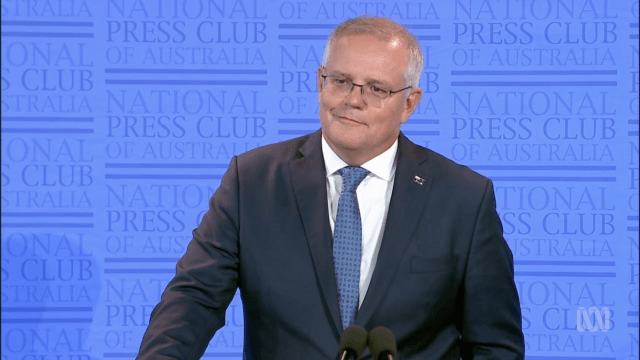It used to be a joke, but it’s not so funny anymore. Google is threatening to block searches in Australia if the country implements a compulsory profit-sharing deal that would force tech giants like Google and Facebook to pay media companies for their content. But Australia’s Prime Minister, Scott Morrison, isn’t sweating it.
Morrison suggested Monday at the National Press Club of Australia that Australians can just use Microsoft’s search engine Bing if Google really wants to leave the country.
“Are you confident that alternate search engines are going to be able to fill a massive void left by Google and Australians won’t be left worse off?” asked Rosie Lewis, a reporter for the Australian newspaper.
“I can tell you Microsoft’s pretty confident,” Morrison responded with a self-assured chuckle.
“When I spoke to Satya the other day, there was a bit of that,” Morrison said while rubbing his hands together and referring to Microsoft CEO Satya Nadella.
After the polite chuckles had died down, Morrison returned to talking points he’d made before, insisting that Australians make Australian law and that the government will not respond kindly to any threats from Google.
“Look, these are big technology companies. And what’s important for Australia is that we set the rules that are important for our people,” Morrison said. “And having a news environment in this country that is one that’s sustainable and is supported commercially, then this is vital to how democracies function.”
The proposed profit-sharing program has been dubbed the Media Bargaining Code and Google users in Australia are currently being inundated with ads about how the proposed program would harm the internet every time they visit Google.
Morrison noted at today’s event that when he met with the leaders of other nations at G20 meetings over the years he often talked not just about how to keep international corporations accountable through tax, but about how to get everyone on the same page when it came to antitrust and competition policy issues.
“I would like to see more alignment between the world’s economies on these sorts of things,” Morrison said, perhaps nodding to the fact that there’s been little traction in the U.S. to break up any of the big tech companies that are sitting on home turf.
But then Morrison hinted at implications of the Media Bargaining Code that haven’t taken centre stage. One potential consequence, as Morrison suggested, was that online speech might be regulated in new ways to ensure a more civil discussion.
“We just want the rules in the digital world to be the same that exist in the real world… in the physical world,” said Morrison. “And that means you can’t go around abusing people and carrying on like people do. You wouldn’t behave like that in a room like this. Or I don’t think you would.”
Needless to say, this element hadn’t really been discussed in mainstream Australian media as a potential consequence of the Code being enforced. But it makes sense that Morrison might be sensitive about the things that are said online. Morrison has become a meme more than once, and if people online were talking about the time you allegedly shit your pants at McDonald’s, you’d probably want a crackdown on trolls as well.
